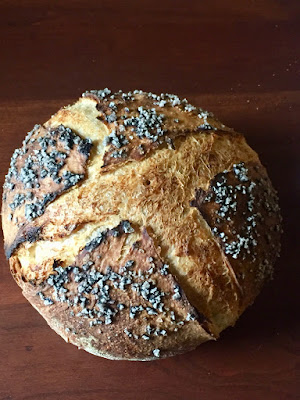Our summer season share of our community supported agriculture [CSA] membership starts this week. For the next eight weeks, each week we'll receive 3/4 bushel of some combination of "vine-ripened tomatoes, peppers, eggplant, cucumbers, onions, broccoli, cauliflower, cabbage, carrots, beets, summer squash, zucchini, string beans, kohlrabi, melons, and sweet corn.... [plus] kale, collards, mustard greens, and chard – plus herbs – garlic – onions, potatoes and more. All specialty and heirloom varieties!"
 |
| home made red beans and rice
Photo by J. Harrington
|
This year's shares at the Amador Farm are sold out, but if you're interested in going local and sustainable with more of your food purchases, you probably want to take a look at Bev Dooley's recent book, The Perennial Kitchen. You could also consider shopping at or becoming a member of one of the area's food co-ops.
 |
| artisan sourdough bread
Photo by J. Harrington
|
During the initial months of the COVID-19 pandemic we decided to extend our definition of local and began purchasing meat in bulk from local producers. We've purchased first a 1/4 hog [chops, roasts, sausage, etc) and, months later, a 1/2 hog from a hog farmer in Spooner WI who specializes in pasture-raised heritage [Mangalista] hogs. For beef, we collaborated with the Daughter Person and Son-In-Law to purchase a whole beef {1/2 for each family] from a Minnesota rancher. We're fortunate to be able to afford artisan solutions as our personal blow against the proliferation of confined animal feed operations [CAFOs] springing up like mushrooms after a wet spring. Despite the fact that our approach means I have to eat more vegetables more often than I'd like (typed Mr. "meat and potatoes'), it aligns nicely with my interest in baking artisan sourdough bread and our interest in living more sustainably and locally.
We're not naive enough to believe that our neoliberal, global problems like loss of biodiversity and climate weirding can be solved at the individual or family scale. We are optimistic (stubborn?) enough to do what we can to support and help develop the systems needed to offer more and more of US a viable alternative to corporate consumerism (typed the former red-necked hippie). Dooley's book has an interesting, and helpful, listing of additional resources "who are creating a sustainable, regenerative, and resilient food system."
Canned Food Drive
We lived in the lucky world—not the far place where fliessipped at eye cornersof children too weak to cry.A camera showed that world to uson posters. But we were children.We wanted most to not be thoseothers, with their terrible bones.We spoke of them wide-eyed, withwhat we thought was tenderness.But our words came in a different register,as if to speak of such betrayalby the grown world could bringa harm of great immensityupon us too. We got to choosefrom the cupboard. We gavewhat we hated—beets, peas,mushrooms. Our dreamswere not of rice. The moonlaid light on our bicycles proppedagainst the porch. Sycamoresbecame our giants standing guard;the overgrown shrub, our fort. We thoughtwe understood what was required.Even crouched beneath our desksduring drill, we said one prayerfor the fear, one for recess.McClellan Air Force Basesent forth big-bellied planesthat rattled the windowsof our houses. Evenings, we tookto the streets shriekingwith joy, rode madly fastaround the block. We collapsedon the lawn breathless, the earthcool beneath us & pounding hard,as if it had one great heart.As if it was ours.
********************************************
Thanks for visiting. Come again when you can.
Please be kind to each other while you can.
No comments:
Post a Comment